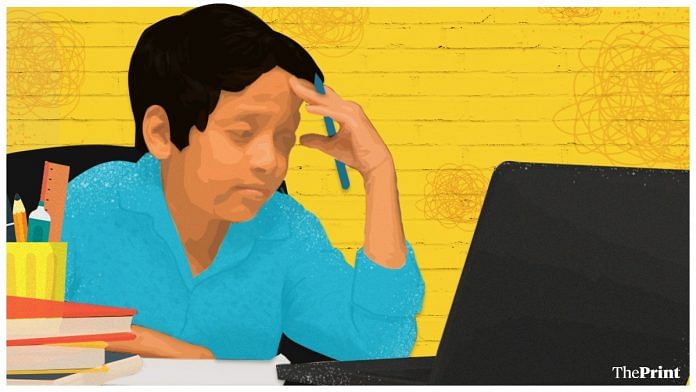New Delhi: Every year, 24 January is celebrated as International Day of Education. However, this year, the day takes on an added significance due to the devastation wreaked on the education sector by the Covid-19 pandemic.
The United Nations also announced that the theme for this year will be ‘Recover and Revitalize Education for the COVID-19 Generation’.
In India, as well, the education sector witnessed major upheaval, with schools and colleges shut for nearly 10 months now. The situation forced students to spend hours in front of digital screens, forgoing traditional classroom interactions.
The pandemic also fast-tracked dropout rates in the country. The Annual State of Education Report (ASER) by NGO Pratham indicated that from 1.8 per cent children not enrolling in schools in rural India in 2018, the number peaked to 5.3 per cent in 2020.
While some believe that online classes have pushed for acceptance towards distant learning and initiated conversation around basic digital training of the Indian masses, it has also highlighted the digital divide that exists in certain sections of the population.
According to a report by the Internet and Mobile Association of India, in 2019, only 33 per cent women had access to internet as opposed to 67 per cent men, and the pandemic has only widened this gender bias.
Furthermore, the 2017-18 National Sample Survey report on education revealed that only 24 per cent of Indian households have internet facility. In rural areas, a little over 15 per cent households had access to internet services while in urban households, about 42 per cent households had this access.
Several reports in the past year also highlighted how the urban poor have been feeling ‘outclassed’ in their quest to ensure that their children are able to attend online classes.
Also read: ‘Hybrid teaching’ to the rescue as colleges look for smooth run in 2021-22 session
Primary students and their ‘new’ school
The sudden shift to the online mode of learning left several students to fend for themselves and many were unable to gather the adequate resources required for virtual classes, especially school students.
According to Chandrakala, principal of a Delhi municipal school in Prem Nagar, “Many students have left Delhi with their parents and have network connectivity issues … they are not connected to us.”
She told ThePrint that even though online classes are going on, a majority of students in her school have not been able to access them.
“To supplement this loss, we call certain students to school and hand them study material but we do not know how much of it is being utilised,” she added.
With all this time in front of a screen, there has also been concerns raised about the lack of attention span in students, especially from pre-primary and primary classes.
However, Eleena Bawa, a primary school teacher from Delhi Public School, Vasant Kunj, noted that this shift has actually led to eight-year-olds paying more attention in class, driven by their curious minds.
But there has been a distinct loss of the social facet of being a student. Virtual screens cannot truly replace the potent social interactions that are imperative during children’s formative years.
Teachers and schools are trying their best to make up for the loss. “We as teachers are trying our best to involve children in various activities, we plan virtual trips to various monuments, make sure they interact with each other through informative discussions in order to bridge this gap, and the children have very well adjusted to such a setup,” Bawa told ThePrint.
She added that online education is not completely bad and has potential. “The future belongs to ‘blended teaching’ — a mix of both online and offline modules.”
Also read: Timetables, tech & lockers — how schools are making sure student bags are the right weight
Life as a university student in a pandemic
A university student’s life has also changed drastically due to the pandemic. It now comprises sitting in front of a screen and tirelessly meeting deadlines.
Divya Kaushish, a first-year student from Vivekananda Institute of Professional Studies told ThePrint: “Every student, especially, the ones who just gave their board exams and waited a whole year to get into colleges, for us to start our first year online was honestly disappointing. The exposure we thought we’d be getting as fresher’s on campus is not the same in online classes.”
Dr Vidya Yervadekar, pro chancellor of Symbiosis International University, Pune, also noted that peer learning of students has definitely been hampered, which is a cause of concern.
“We at Symbiosis made sure that classes were interactive enough and with the help of Symbiosis Centre for Emotional Wellbeing (SCEW), we provided a lot of emotional backing to parents as well as students through counselling sessions,” Dr Yervadekar told ThePrint.
This period has also been particularly challenging for university administrations, particularly in terms of students that lack basic infrastructure for online education.
“Two schools run by Symbiosis in rural areas experienced difficulty in providing access to certain students, but teachers stepped up here and taught on call, and many students’ fathers left their smart phones with their ward to make sure they attend school,” said Yervadekar.
She added that while online teaching has certain disadvantages, a blended education module, with both virtual and physical classes, can change education in this country for the better.
“Every crisis teaches one something, so even Covid-19 has taught us a lot. My advice to students of this country would be to look at the silver lining of this cloud because soon we will have campuses running, and I’m sure everyone will forget about this but still remember how they came out of this crisis unscathed,” Dr Yervadekar said.
Saumya Sharma is an intern with ThePrint
Also read: As digital divide widens, India risks losing a generation to pandemic disruption




99% of the students weren’t learning anything in either the school or college. Covid made no difference to their learning. They remained as ignorant as ever.